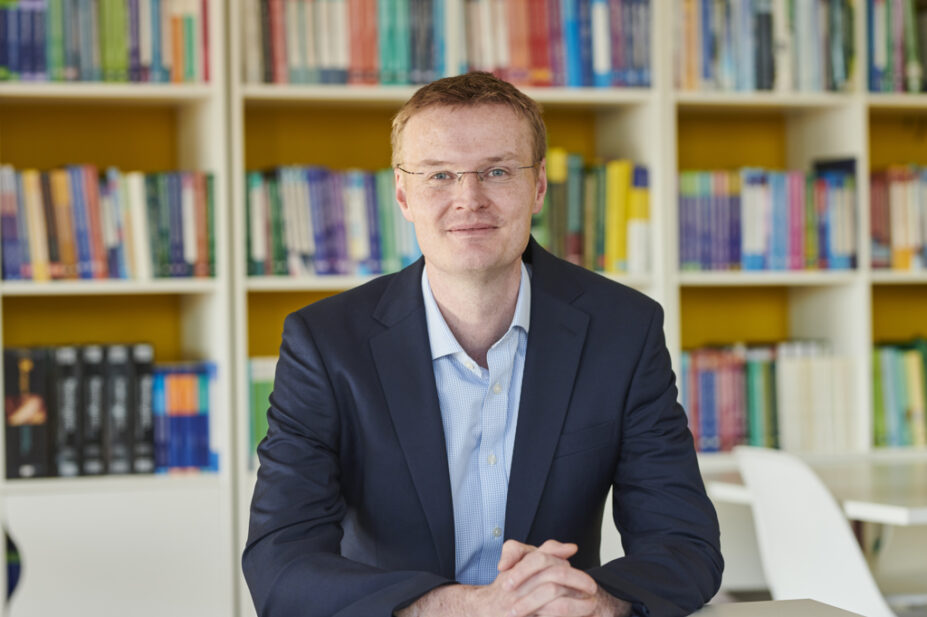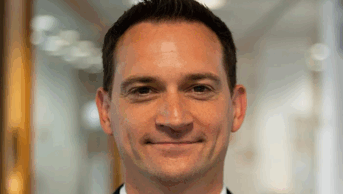
Paul Stuart
James Davies has had an incredibly varied career. Originally a hospital pharmacist, he then undertook a PhD at University College London between 2009 and 2013, looking at business models for the future for community pharmacy. As part of that, Davies was part of the team that carried out the national evaluation of the new medicine service in England, before working at the Company Chemists’ Association for just over a year, as part of their policy team.
In 2014, he joined the online doctor service ZAVA, getting its pharmacy service up and running. “When I joined, there were about 12 people and when I left there were about 300,” he says.
“Pre-COVID, before anyone else started to do online consultations, we were the largest online provider of medical consultations for Europe.”
In his latest position as director for England at the Royal Pharmaceutical Society (RPS), which he took up in January 2023, he has a lot to focus on. This includes the ambitious RPS vision for pharmacy practice in England which, among other things, calls for the complete integration of pharmacy professionals across the whole healthcare system. The Pharmaceutical Journal caught up with Davies to find out what is dominating his in-tray.
You’ve had an incredibly diverse set of experiences. How does that help with your role in the Royal Pharmaceutical Society?
The RPS represents all of pharmacy and so it is helpful: I’ve had the community experience, the research side, the academic experience, I’ve had the hospital experience. Getting those diverse views of different pharmacy groups, understanding where their priorities lie and building that into the future for the profession has been quite helpful. So, a bit of a jack of all trades and master of none.
Your PhD is very relevant now that there is so much talk about the future of community pharmacy. Is that something that you’re still focused on?
At the time, there was funding to look at community pharmacy and community pharmacy models, which partly took me in that direction. I had seen — having been in in a hospital environment where automation was becoming more common — robots becoming more commonplace in hospitals. There was a big opportunity to see whether some of those shifts could move into the community pharmacy sector to allow the dispensing side to be more automated, and to put pharmacists more in the forefront of clinical roles. And that was interesting to me and it took me in that research direction.
You can have a clinical pharmacist operating in a clinical way and the supply side can be done in a more automated way
Can automation take the burden away from community pharmacists?
Yes, very much. And it’s not just about the shift in workload — for me the patient safety side is important. If you can set up the systems and the processes as efficiently and effectively as possible, we can make them safer. That was also a key thing that came out some of the research that we did: you can have a clinical pharmacist operating in a clinical way and the supply side can be done in a more automated way.
What are the priorities for 2023?
I’m very lucky, as I’m starting the role with a vision already set out. My job now is to turn that into reality. It’s a big vision and it’s across the whole diversity of the profession. There are a few areas that we’re specifically focusing on, and not just England-only: we’re looking at areas of commonality across Wales and Scotland.
So, the big ones for this year: independent prescribing. We’ve got the pathfinder sites that are rolling out across England, which are really interesting — seeing independent prescribing happening at a community pharmacy level and at scale. There’s lots of areas that the RPS can support in doing that, but also to resolve some of the policy questions, or the unanswered questions, that sit in a situation where you have the prescribing and the supply taking place within the community pharmacy.
The next area is the ongoing changes around supervision and what that will mean. Many of the key areas of the vision talk about workforce. The legislation and the enacting of the legislation through the guidance from The General Pharmaceutical Council, and from the Department of Health and Social Care, will be key in delivering some of those aspects of the vision for the future. Thinking about how supervision works, how it’s structured, how to operate, how it’s understood and how it’s enacted are going to be key to a lot of what we do.
A constant theme is making sure that the profession is as diverse as it can be, and diversity in senior positions
A constant theme is making sure that the profession is as diverse as it can be, and diversity in senior positions. The RPS is well known for its inclusion and diversity approaches and strategy over the past few years. We are going to be doing a review of our strategy, seeing what has been successful, what hasn’t and picking up on those areas that we can further support. A particular area of focus for us, working with the British Pharmaceutical Students’ Association, is differential attainment with students and their ability to qualify and become pharmacists. We want to understand in more detail why that’s happening, but we think there’s a lot more that can be done to resolve that difference.
The other big bucket of work for us is environmental sustainability. There are many facets to that. But we are clear that the community pharmacy has a key role to play: not just at the prescribing level, and the actual medicines themselves, but also in the setup of pharmacies and how supply chains can be made greener — sustainability all the way through the system, supporting the NHS targets about a path to net zero. There’s quite a bit of work already being done at a secondary care level, but how can we support pharmacies at the community level to be able to be greener, effectively?
Another theme from the vision is about leadership and collaboration. And this isn’t a specific focus for the England team, it’s a focus for the overall RPS. I think it’d be remiss not to mention the Commission on Pharmacy Professional Leadership’s report, which has now been made public, and we need to reflect as an organisation about how the RPS continues to operate in light of that report.
Do you think that England should get a Scottish-style ‘Pharmacy First’ service? And if so, how should it be funded?
Absolutely. And I think that has been universally recognised. We saw through the pandemic how pharmacists are going above and beyond to be able to serve and support their communities, and we need to make sure that continues to be the case. I think the second part of your question is probably the more pressing one: we can’t just have a Pharmacy First service that is not properly funded, properly supported.
It’s not for me and it’s not for the RPS to talk about the detail of the funding. That’s why we have the Pharmaceutical Services Negotiating Committee: they are the organisation that works closely with government to come up with what that funding should look like. But where the RPS is, and where I am at, is that I want the sector to be sustainable for the future. And the funding and agreements have to enable that. If we add an inappropriately funded or supported service onto an already overstretched and burnt-out workforce, it’s not going to be a success and it’s not going to be a benefit for our patients.
From visiting community pharmacies, I know it’s incredibly tough out there
RPS surveys have shown a constant trend towards more exhaustion, more burnout and more challenges for staff on the ground. From visiting community pharmacies, I know it’s incredibly tough out there. So the prospect of then throwing on another service without the support, the infrastructure and the backing behind it is just going to be another straw to break the camel’s back. That’s not to say don’t do it, but we need to make sure that we’re doing it the right way. This is where the independent prescribing pathfinder sites come in. But when we find the right models and the right ways of doing it, we then need to have the appropriate support and implementation in place. One of the concepts that I quite like the idea of is the ‘golden prescription’: the first prescription issued by an independent prescriber in a community pharmacy setting is the most expensive one because, to be able to issue that first prescription, you’ve got to have had all the setup, the infrastructure, the support, the training. All of those things have got to be in place for that to start. It’s not just about the sustainability of a service going forward. It’s also about the support and rigor that needs to go in to get that first prescription written, because once you’ve managed the first prescription, the subsequent ones are going to be easier.
Is there one message that you’d like to give people reading this?
I’m lucky to come into the RPS and I have inherited a great team. The team is very dedicated and working very hard on a huge range of areas and topics to deliver for pharmacists, pharmacy teams and our members. I’m confident that I can continue the legacy of the previous directors and can improve communication and engagement about all of the great work that we’re doing. We do all this work in the media, but we’re not necessarily always conveying that to our members in ways that we should. I’m going to try and do that a bit more, and make sure that the great stuff that we’re doing is heard about it.
1 comment
You must be logged in to post a comment.
You may also be interested in

Ngozi Kalu: ‘When research lacks representation, findings become biased and inequalities emerge’

Henry Gregg: ‘The only way to slow down pharmacy closures is to start closing that £2.6bn funding gap’

Looking forward to working with you James :)